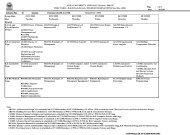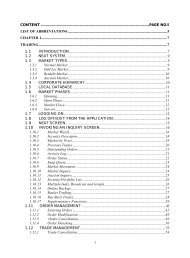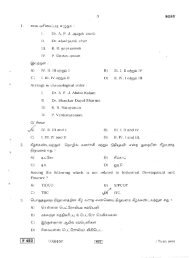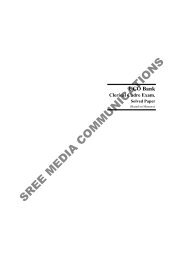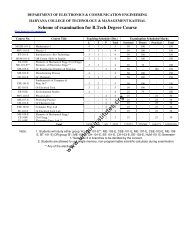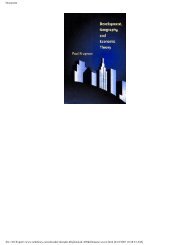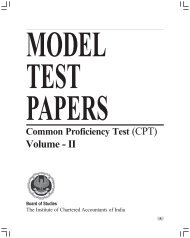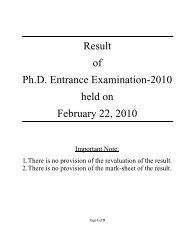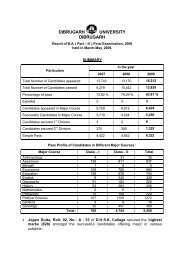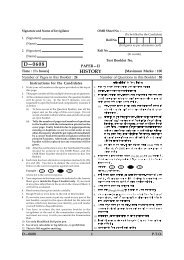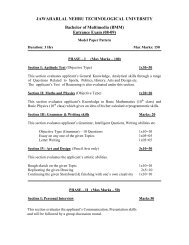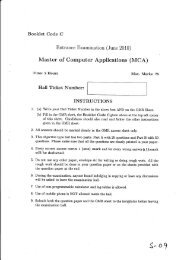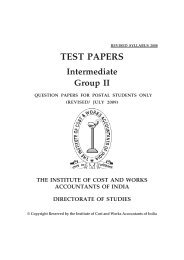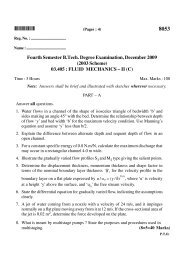UNIT – I Lesson 1 HRM – AN OVERVIEW Lesson Outline Nature of ...
UNIT – I Lesson 1 HRM – AN OVERVIEW Lesson Outline Nature of ...
UNIT – I Lesson 1 HRM – AN OVERVIEW Lesson Outline Nature of ...
Create successful ePaper yourself
Turn your PDF publications into a flip-book with our unique Google optimized e-Paper software.
atings he or she would receive. At the same time, the person is fully aware that while a<br />
good review might lead to tremendous improvement in pay and positions, a mediocre or<br />
poor rating could lead to being removed from the job. Though the stress might be workrelated,<br />
they might have been caused by personal factors, or job-related factors.<br />
Different types <strong>of</strong> Stress affects people’s work lives. Not all stress would be<br />
termed as bad and therefore, the goal <strong>of</strong> stress management is not to entirely eliminate<br />
stress from people’s lives. Stress can have positive effects. Positive stress or Eustress can<br />
help people to respond quickly and with adequate force in times <strong>of</strong> emergencies such as<br />
avoiding an automobile collision, moving away from flying objects, fighting a fire etc.<br />
Positive stress is useful in speeding up the pace <strong>of</strong> work to meet deadlines. It helps one to<br />
push one’s limits to improve performance rapidly and to realize one’s fullest potential over<br />
a period <strong>of</strong> years in career.<br />
Neustress is a type <strong>of</strong> stress that is neither helpful nor harmful to the persons who<br />
are stressed. Stress could be sometimes anticipatory in which arousal is stimulated by an<br />
expected stressor. This is <strong>of</strong>ten caused by inadequate preparation or pessimism. Current<br />
stress is arousal that takes place during an experience. Stress could also be residual at<br />
times, in which the arousal continues to remain even long after the stressful event has<br />
passed. Inability to overcome the trauma <strong>of</strong> an event is the cause <strong>of</strong> residual stress. Lack <strong>of</strong><br />
support during and first aid immediately after stressors could be the causes <strong>of</strong> residual<br />
effects on people.<br />
4.12.1. Symptoms <strong>of</strong> negative stress: Stress might manifest itself in a number <strong>of</strong> ways.<br />
The symptoms may be physiological, psychological and behavioral. For example, stress<br />
could create changes in metabolism, increase heart and breathing rates, increase blood<br />
pressure, bring on headache, tighten shoulders, stuttering in speech, creation <strong>of</strong> trembling<br />
all over the body, backache and arthritis, induce heart attacks or reduce appetite in a<br />
person. Alternatively, an employee who is experiencing a high level <strong>of</strong> stress may have<br />
psychological impact and as a result might become depressed, compulsive in action,<br />
irritable, confused, bored, accident-prone, startled, argumentative, distracted,<br />
procrastination-prone or indecisive. Behaviorally related symptoms <strong>of</strong> stress include<br />
changes in productivity, absence, turnover, increased smoking or consumption <strong>of</strong> alcohol,<br />
fidgeting and sleep disorders.<br />
Stress contributes to illness at least in four ways:<br />
• By imposing long-term wear and tear on the body and mind, thereby reducing<br />
resistance to disease.<br />
• By directly precipitating an illness such as tension headache or heart attack.



